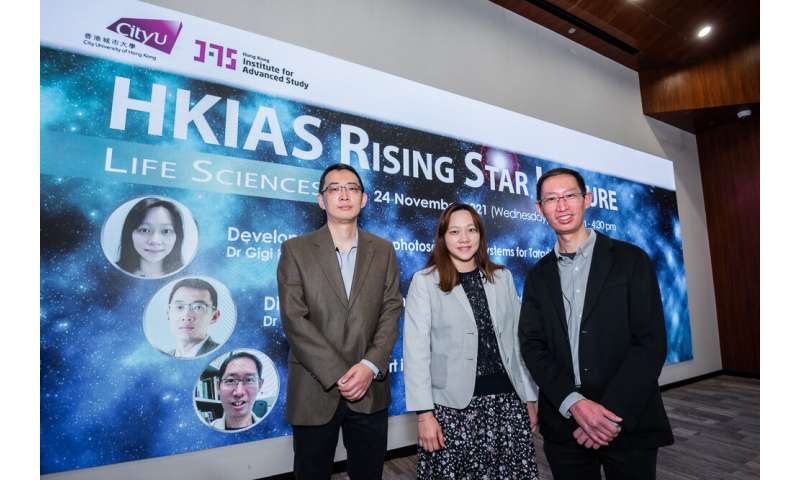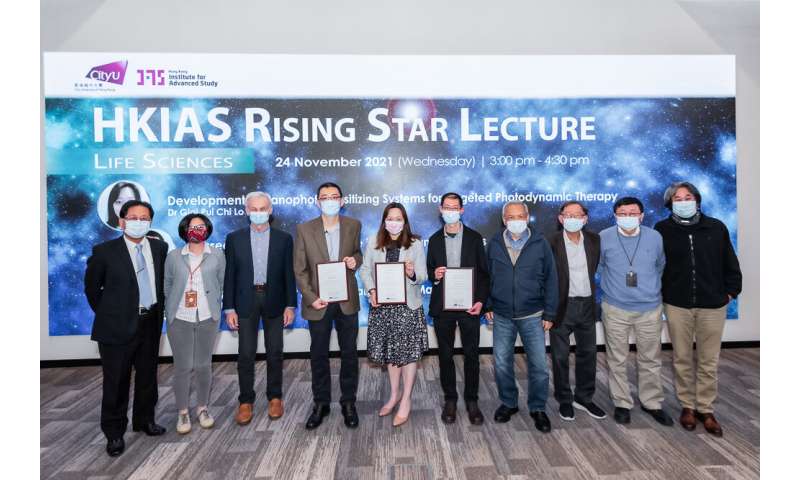HKIAS Rising Star Lecture - Life Sciences

The HKIAS Rising Star Lecture—Life Sciences was held at the City University of Hong Kong (CityU) and online on 24 November 2021 (Wednesday). Three emerging biomedical scientists addressed how fundamental research in the life sciences could potentially bring hope for patients.
Dr. Gigi Pui Chi Lo, an Associate Professor at the Department of Biomedical Sciences of CityU, delivered a talk on "Development of Nanophotosensitizing Systems for Targeted Photodynamic Therapy". Tumour photodynamic therapy (PDT) involves the excitation of a photosensitizer, followed by the generation of reactive oxygen species to damage tumour cells. Dr. Lo, a specialist in cancer diagnosis and treatment, highlighted her recent studies of advanced nanophotosensitizers for addressing the various challenges of this treatment modality.
Dr. Lo obtained her BSc degree in Chemistry with first-class honors in 2001 and a Ph.D. degree in 2005 from The Chinese University of Hong Kong (CUHK). Subsequently, she went to the Division of Biophysics and Bioimaging of the Ontario Cancer Institute, serving as a Postdoctoral Fellow for two years. She developed her research interest in "smart" theranostic agents for cancer diagnosis and treatment.
In the next presentation, Dr. Liang Zhang, an Assistant Professor of the Department of Biomedical Sciences of CityU, discussed " Dissecting Protein Interactome in Health and Diseases". Dr. Zhang, who leads studies in proteomics and signaling in tumour microenvironment, focused on the 'interactome' of protein molecules, such as protein-RNA interactions. He proposed the CRISPR-Assisted RNA-Protein Interaction Detection (CARPID) method to delineate RNA-protein interactions in live cells, which could inform the development of new biomarkers and therapeutics.

Dr. Zhang is an expert in cancer biology and proteomics. He received his Bachelor's degree in Medicine from Peking University Health Science Center in Beijing, China. He obtained his Ph.D. degree from the University of Iowa. His research centers on applying state-of-the-art mass spectrometry and proteomics technologies to dissect the signaling mechanisms of homeostasis and diseases.
Wrapping up the lecture series was a neuroscientist, Dr. Kwok On Lai, an Assistant Professor of the Department of Neuroscience of CityU; he explored "RNA Transport in Neuron and Why It Matters". Dr. Lai updated his ongoing research into the synaptic transcriptome of the brain and disease mutations on RNA-binding protein through genome editing in human stem cells. He highlighted that this work could answer long-standing questions surrounding dendritic mRNA transport and translation, two important processes that are disrupted in various brain disorders.
Dr. Lai received his Bachelor's degree in Biochemistry with first-class honors from the University of Hong Kong. He then pursued M.Phil. and Ph.D. studies at the Hong Kong University of Science and Technology. In addition, he was awarded the Croucher Fellowship in 2003. His recent research focuses on the investigation of disease-associated genetic variations using human stem cell-derived neurons.
This lecture is supported in part by the Kwang Hua Educational Foundation.
Provided by Hong Kong Institute for Advanced Study